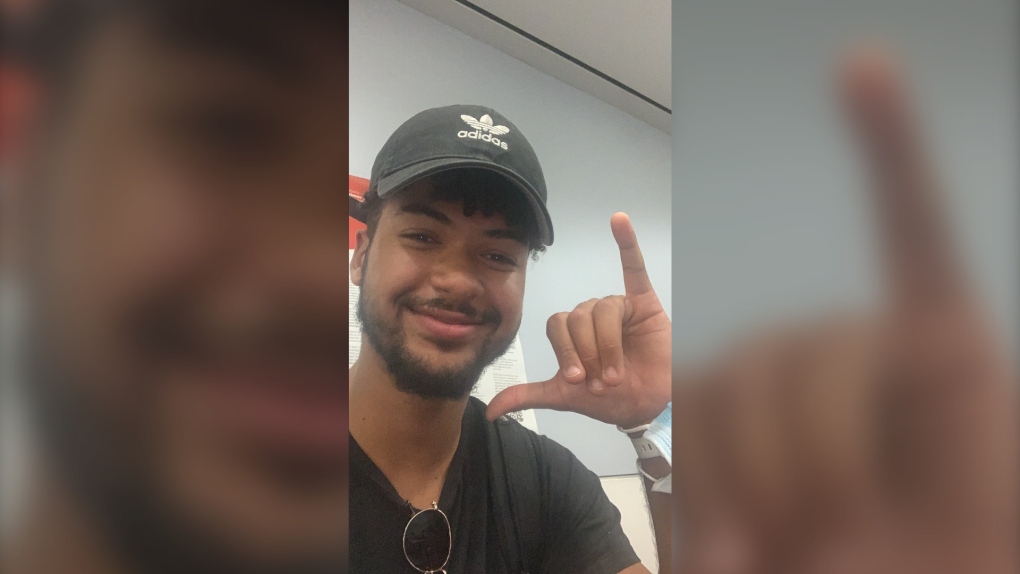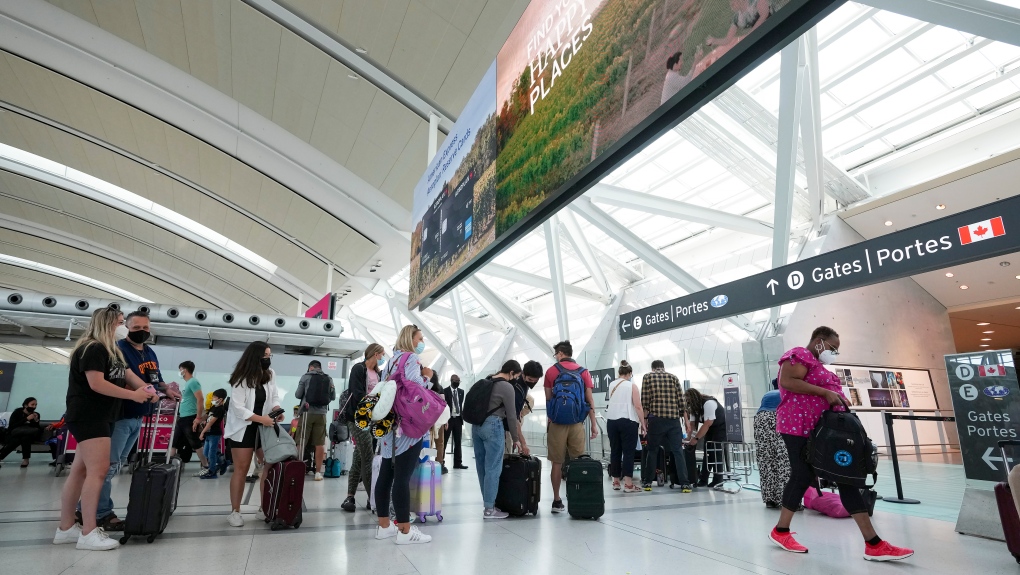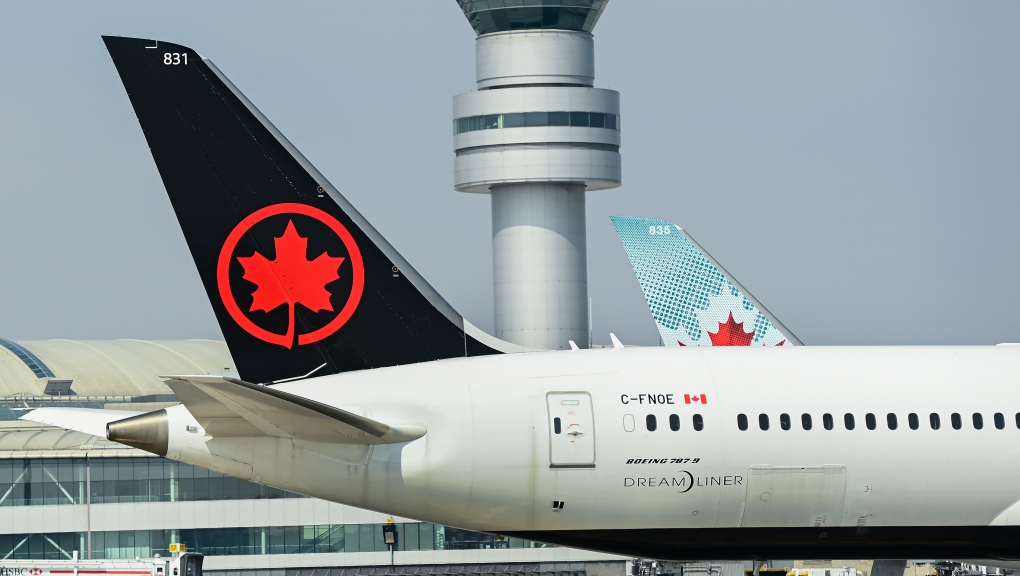Man thrown in jail for nearly 1 week after drug test at Toronto Pearson 'wrongfully' finds cocaine in luggage
A 22-year-old U.S. man travelling through Toronto Pearson airport was forced to spend nearly a week locked up in an Ontario prison after authorities mistakenly thought he was hiding cocaine in shampoo bottles.
Yeremy Cuevas Tolentino, an airline worker from Boston, said he is recovering from the traumatic ending to his week-long vacation to Brazil in April.
“I really want justice,” he told CTV News Toronto in an interview.
Since he works for Cape Air, a small aircraft-carrier based out of Massachusetts, Cuevas Tolentino said he often travels on standby and flies unusual routes. Because of this, he often has to book and cancel multiple flights.
He said he booked multiple flights to get back home quicker after his trip, and chose a route from Sao Paulo to Boston that connected through Toronto Pearson International Airport on April 8.
When he got off the plane in Toronto, Cuevas Tolentino said he had to pick up his bags and go through security screening before his connecting flight to Boston.
But when he reached the U.S. Customs line, he was pulled aside for extra questioning. He said he thought at first it was because he had mangos and oranges in his bag, which he had packed for a snack.
 Yeremy Cuevas Tolentino the day he was released from Maplehurst Correctional Complex. (Courtesy of Yeremy Cuevas Tolentino)
Yeremy Cuevas Tolentino the day he was released from Maplehurst Correctional Complex. (Courtesy of Yeremy Cuevas Tolentino)
As the border services agent asked him more questions, Cuevas Tolentino said he realized it actually had something to do with the number of flights he booked trying to get out of Brazil.
‘POSITIVE TEST FOR COCAINE’
Cuevas Tolentino said he started to get “a little worried” when more customs agents were brought in and they start searching through his phone and belongings.
It was at this point, Cuevas Tolentino said, he was given news that left him shocked.
“They told me I may have some narcotics in my bag … I didn’t know what to do,” he said.
Cuevas Tolentino said he was told he would be handed over to Canadian border officials since he was in Toronto.
And it was the same process all over again, he said. Cuevas Tolentino said Canadian officials went through his bag, papers, and asked him multiple questions.
It was at this point, he was told three shampoo bottles in his bag tested positive for cocaine.
“The guy tested it in front of my face, and he did it twice,” Cuevas Tolentino said.
‘HE’S GOING TO JAIL’
According to the RCMP’s report of Cuevas Tolentino’s arrest, reviewed by CTV News Toronto, Canada Border Services Agency (CBSA) used a Narcotics Identification Kit (NIK) to test his belongings for drugs.
“CBSA officer stated that they swabbed the shampoo bottles, the result initially faded, so CBSA swabbed the bottles again, this time they stayed blue, which indicated a positive test for cocaine,” the report said.
While the CBSA couldn’t comment on Cuevas Tolentino’s case specifically due to the Privacy Act, a spokesperson told CTV News Toronto that a NIK uses a series of tests that are typically conducted two to six times. For cocaine, the border services agency runs a specific cocaine swab, which is “sensitive to trace amounts of residue.”
 People line up before entering the security at Pearson International Airport in Toronto on Friday, August 5, 2022. THE CANADIAN PRESS/Nathan Denette
People line up before entering the security at Pearson International Airport in Toronto on Friday, August 5, 2022. THE CANADIAN PRESS/Nathan Denette
Criminal defence lawyer Alexander Karapancev told CTV News Toronto NIK tests are the first step authorities use to check for illegal drugs, but are not the type the Crown would rely on at a trial. “They need to be submitted for proper analysis. The NIK test doesn’t do that,” he said.
Cuevas Tolentino was arrested for the importation of a controlled substance and was taken to the airport’s holding cells. He was eventually put in contact with duty counsel, fingerprinted, and the RCMP called his family to inform them what happened.
“My uncle was the one to answer the phone, he told me that they just said, ‘Hey, your (nephew) is detained, he has five kilograms of cocaine in his bag, and he’s going to jail,’” Cuevas Tolentino recounted. “Which is not the right thing, you know. My mom was going crazy, as you can imagine any mom would.”
'I SAW SO MANY BAD THINGS'
The following day, on April 9, Cuevas Tolentino attended his bail hearing and was remanded to Maplehurst Correctional Complex, a medium and maximum-security facility roughly 40 kilometres away from Toronto Pearson airport.
“They treated us so bad in jail. I saw so many bad things, crazy things that happened there,” he said, adding the prison guards didn’t treat him like he was human, but like an “animal.”
Cuevas Tolentino said he shared his cell with two other inmates, where he alleges they were forced to take turns sharing a bunk since there wasn’t enough space for them to each have their own bed.
Throughout the week, Cuevas Tolentino said someone attempted suicide, an inmate was stabbed, a “gang fight” broke out, and people cried and screamed at all hours of the night.
“I was just so, so, so grateful, because the people I was with, they weren’t trying to hurt me at all. They were actually giving me advice,” he said.
In a statement to CTV News Toronto, the Office of the Solicitor General confirmed Cuevas Tolentino was remanded at the correctional facility from April 9 to 14, but did not provide any further comment.
The hardest part about being put in jail, Cuevas Tolentino says, was staying inside his cell for the entire week without any information on what’s going on or what’s going to happen next.
“The only thing that I was told was that I was going to probably be there for 15 years, 20 years.”
Karapancev told CTV News Toronto this correctional facility is “notorious” for having difficult conditions for inmates, particularly with lockdowns, adding judges are “well aware of the unfortunate conditions.”
“Often times, if they’re under full lockdown, they don’t get to see the outdoors at all,” Karapancev said. “Their ability to shower and have basic hygiene is restricted, because of that, they’re not let out of their cells. They’re overcrowded in their cells with multiple prisoners in them, so they’re really deplorable conditions that a lot of inmates suffer at Maplehurst.”
HEALTH CANADA FINDS NO DRUGS
Cuevas Tolentino’s shampoo bottles were sent to Health Canada for drug testing on April 11, according to the RCMP’s report, two days after he was brought to Maplehurst Correctional Complex.
 A plane is seen on the tarmac at Toronto Pearson. (The Canadian Press)
A plane is seen on the tarmac at Toronto Pearson. (The Canadian Press)
Another two days later, on April 13 at 4:46 p.m., the RCMP received the Certificate of Analyst from Health Canada, which determined “there were no substances within the (Controlled Drugs and Substances Act)” in the shampoo.
According to the police report, officers didn’t arrive at the jail until after 1 p.m. the next day to notify Cuevas Tolentino the charges would be dropped.
Cuevas Tolentino was told he would be released that evening.
“I was happy, I was screaming, ‘Yes, I knew it!’” Cuevas Tolentino said. “It was a beautiful moment.”
A spokesperson for the RCMP’s Ontario Division confirmed to CTV News Toronto that following further investigation, they determined charges against Cuevas Tolentino were not supported.
“All charges against Mr. Cuevas-Tolentino were subsequently dropped.”
Karapancev said it is not unusual for individuals to be remanded while waiting for further drug testing, adding it is a constitutional right under the Criminal Code for a criminal offence to be brought to court within 24 hours to have bail addressed.
Cuevas Tolentino flew back home to Boston on April 15.
“When I got here, everyone was going crazy, you know, my mom especially, my uncle, cousins, everyone in my job, everyone,” he said. “It took a few weeks for me to calm down, and enjoy freedom.”
As of now, Cuevas Tolentino has not acquired legal representation, but said he is looking at what his best option is.
“I just want justice, to be honest.”
CTVNews.ca Top Stories

Trump suggests the U.S. should take back the Panama Canal. Could they do that?
Donald Trump suggested Sunday that his new administration could try to regain control of the Panama Canal that the United States 'foolishly' ceded to its Central American ally, contending that shippers are charged 'ridiculous' fees to pass through the vital transportation channel linking the Atlantic and Pacific Oceans.
Man handed 5th distracted driving charge for using cellphone on Hwy. 417 in Ottawa
An Ottawa driver was charged for using a cellphone behind the wheel on Sunday, the fifth time he has faced distracted driving charges.
Wrongfully convicted N.B. man has mixed feelings since exoneration
Robert Mailman, 76, was exonerated on Jan. 4 of a 1983 murder for which he and his friend Walter Gillespie served lengthy prison terms.
What's open and closed over the holidays in Canada
As Canadians take time off to celebrate the holidays, many federal offices, stores and businesses will be closed across the country on Christmas Day and New Year's Day.
opinion Christmas movies for people who don't like Christmas movies
The holidays can bring up a whole gamut of emotions, not just love and goodwill. So CTV film critic Richard Crouse offers up a list of Christmas movies for people who might not enjoy traditional Christmas movies.
Can the Governor General do what Pierre Poilievre is asking? This expert says no
A historically difficult week for Prime Minister Justin Trudeau and his Liberal government ended with a renewed push from Conservative Leader Pierre Poilievre to topple this government – this time in the form a letter to the Governor General.
More than 7,000 Jeep SUVs recalled in Canada over camera display concern
A software issue potentially affecting the rearview camera display in select Jeep Wagoneer and Grand Cherokee models has prompted a recall of more than 7,000 vehicles.
'I'm still thinking pinch me': lost puppy reunited with family after five years
After almost five years of searching and never giving up hope, the Tuffin family received the best Christmas gift they could have hoped for: being reunited with their long-lost puppy.
10 hospitalized after carbon monoxide poisoning in Ottawa's east end
The Ottawa Police Service says ten people were taken to hospital, with one of them in life-threatening condition, after being exposed to carbon monoxide in the neighbourhood of Vanier on Sunday morning.

































